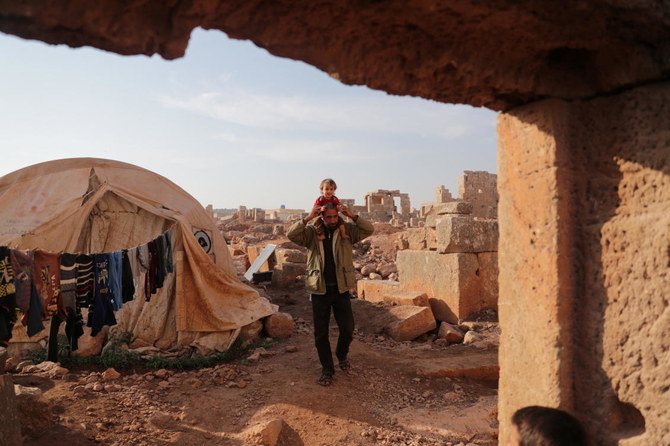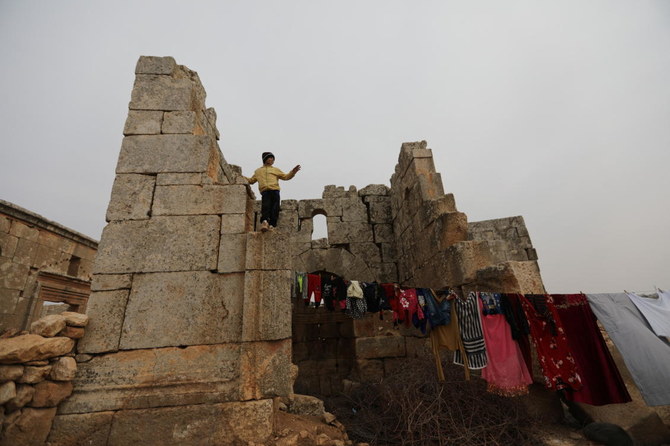IDLIB PROVINCE, Syria: Mohamad Othman remembers going on school trips to ancient archaeological sites in Syria, never imagining one of them would become his home.
Othman and his family have been living in a tent amidst ancient ruins at Sarjableh near the Turkish border since fleeing for their lives some 2-1/2 years ago during a government offensive in northwestern Syria.
Rocks gathered from the site anchor down their tent, one of several dozen that are sheltering families who have fled their homes during the decade-long Syrian war.
Their clothes hang to dry on two lines strung between the tent and an ancient stone portico. Their children clamber over the rocks and balance on walls in this unusual if dangerous playground.
“In the summer, we face scorpions, snakes and dust, and all the pressures of life, and in winter the cold. The situation is desperate. There are no health services,” Othman, 30, said.
He said shelling forced them to flee their village near Maarat Al-Numan, an area close to the frontline between government and rebel forces that has been pummelled in various bouts of conflict during Syria’s decade-long conflict.
A father of four, he struggles to make an income, depending on seasonal work such as olive picking and any other jobs he can pick up. When there is no work, he is forced to go into debt to provide the basics. His children do not go to school.
“When the last bombardment and attack began, we left to come to here,” Othman said. “We did not find a place to take shelter, so we lived here among the ruins.”
The site, an early Christian settlement with ruins dating to the 5th century, has been popular with the displaced because they do not have to pay to stay there, unlike other areas where landowners charge rent.
“Everyone here used to have land that we would farm and we had livelihoods in our villages and did not need anyone. But our fate was to be displaced,” Othman said.
“We did not leave our land by our own free will to come to an area that has been uninhabited for thousands of years.”
There are some 2.8 million displaced people in northwestern Syria, with 1.7 million of them in sites for the internally displaced, the United Nations says.
Not far from Sarjableh, in another corner of the northwestern province of Idlib, the ancient site of Babisqa is also providing shelter for those bombed out of their homes.
In an earlier phase of the war, rebels used the site as a base, operating from ancients caves hewn from the rock where wiring installed by the opposition fighters can still be seen.
Among the 80 or so families living at the site, it is known as ‘Kharrab camp’, or ‘Ruins camp’.
Livestock farmers, they took their sheep and goats with them when they fled into rebel-held areas from territory now under Syrian government control. Today, sheep and goats feed amid the ancient stones, with poultry pecking on the ground.
Some people have used stones from the ruins to build their shelters, some of which are equipped with small solar panels propped up outside. An antennae strapped to the side of one of the homes provides Internet.
Mahmoud Abu Khalifa, a 35-year-old father of seven, stores family possessions and animal feed in an ancient cave hewn out of the rock. He keeps his sheep in a pen amidst the stones.
“Before being displaced, we had agricultural land and farmed crops and lived from them and everything was great and we had these animals,” he said.
Today “the children live in the ruins and mud,” he said. “The situation is very desperate,” he said.
“Our one demand is to return to our villages.”
Life in ruins: Ancient sites shelter Syria’s displaced
https://arab.news/624qu
Life in ruins: Ancient sites shelter Syria’s displaced

- Othman and his family have been living in a tent amidst ancient ruins at Sarjableh near the Turkish border
- Their clothes hang to dry on two lines strung between the tent and an ancient stone portico
Israel PM holds coalition meeting after objecting to Gaza panel

- Israeli Prime Minister Benjamin Netanyahu convened a meeting of his ruling coalition partners on Sunday after objecting to the composition of a Gaza advisory panel
JERUSALEM: Israeli Prime Minister Benjamin Netanyahu convened a meeting of his ruling coalition partners on Sunday after objecting to the composition of a Gaza advisory panel formed by the White House, according to an official and media reports.
The White House announced this week the setting up of a “Gaza Executive Board,” which would operate under a broader “Board of Peace” to be chaired by US President Donald Trump as part of his 20-point plan to end the war in Gaza.
The executive board, described as having an advisory role, includes Turkish Foreign Minister Hakan Fidan and Qatari diplomat Ali Al-Thawadi, alongside other regional and international officials.
Late on Saturday, Netanyahu’s office objected to the composition of the executive board.
“The announcement regarding the composition of the Gaza Executive Board, which is subordinate to the Board of Peace, was not coordinated with Israel and runs contrary to its policy,” the office of Netanyahu said.
“The Prime Minister has instructed the Foreign Affairs Minister to contact the US Secretary of State on this matter.”
It did not explain the reason for its objection, but Israel has previously objected strongly to any Turkish role in post-war Gaza, with relations between the two countries deteriorating sharply since the war began in October 2023.
In addition to naming Turkiye’s foreign minister to the executive board, Trump has also invited Turkish President Recep Tayyip Erdogan to join the overarching Board of Peace.
Media reports said that leaders of the country’s ruling coalition were scheduled to meet on Sunday to examine the composition of the executive board.
“There is a meeting scheduled of the coalition at 10:00 am (0800 GMT),” the spokesman of Netanyahu’s Likud Party told AFP, declining to provide further details.
Alongside Likud, the coalition includes the Religious Zionist Party led by far-right Finance Minister Bezalel Smotrich and Otzma Yehudit (Jewish Power) led by far-right National Security Minister Itamar Ben Gvir.
The White House said Trump’s plan would include three bodies: the Board of Peace, chaired by Trump; a Palestinian committee of technocrats tasked with governing Gaza; and the Gaza Executive Board, which would play an advisory role.
The Palestinian technocratic committee held its first meeting in Cairo on Saturday.
The diplomatic developments came as the United States said this week that the Gaza truce plan had entered a second phase, shifting from implementing a ceasefire to the disarmament of Hamas, whose October 7, 2023 attack on Israel triggered the Israeli offensive in Gaza.
















